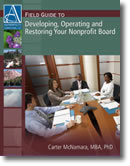Orienting New
Members to Boards of Directors
© Copyright Carter
McNamara, MBA, PhD
Board orientation is intended to prepare
new board members for their board role in the organization. Orientation
is also extremely useful for all members to ensure they are operating
from the same “script.” Whether done only with new members
or with the entire board, orientation is a strong team-building
activity that should be conducted once a year, either before a
regular board meeting or during the retreat — particularly after
new board members have been recruited.
1. The board chair and the chief executive typically facilitate
the orientation session.
2. Ensure introductions and consider using name tags.
3. Review several topics, including:
– the Board Manual (see “Board Manual Index”)
– mission, vision and values of the organization
– some the organization’s history
– roles and responsibilities of the board and the staff
– administrative calendar which schedules major activities of
the board
– organizational chart, including the list of current and planned
committees
– about how the board conducts meetings, including relevant actions
from the
Roberts’ Rules of Order
4. Ensure adequate time for questions and answers.
5. Consider assigning a “buddy,” or current board member
to help orient a new board member.
6. Involve new members as soon as possible in relevant committees
by asking new members to consider membership on a current or new
committees.
Return to Recruiting and Orienting
New Board Members
For the Category of Boards of Directors:
To round out your knowledge of this Library topic, you may want to review some related topics, available from the link below. Each of the related topics includes free, online resources.
Also, scan the Recommended Books listed below. They have been selected for their relevance and highly practical nature.


